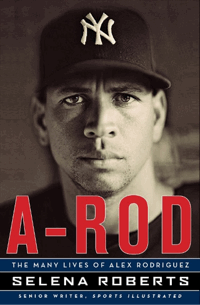 When Selena Roberts broke the story in February that A-Rod was one of the 104 names on the supposedly anonymous list of steroid users, we quickly learned that she did so while in the process of researching a book about the Yanks’ enigmatic superstar. For months, as the book’s release date moved around to accommodate A-Rod’s stint on the disabled list, we wondered what shocking revelations the book would hold.
When Selena Roberts broke the story in February that A-Rod was one of the 104 names on the supposedly anonymous list of steroid users, we quickly learned that she did so while in the process of researching a book about the Yanks’ enigmatic superstar. For months, as the book’s release date moved around to accommodate A-Rod’s stint on the disabled list, we wondered what shocking revelations the book would hold.
In the end, the answer ended up being “not very much.” Short on sources and new information, A-Rod: The Many Lives of Alex Rodriguez comes across as a faux-amateur psychologist’s examination of A-Rod’s supposed daddy issues. It features some allegations about pitch-tipping that have been refuted on the record by numerous teammates of Alex’s, and Roberts attempts to portray A-Rod as guilty by association because he lived in Miami at the same time that other, more famous people who used steroids were there as well. As the low sales numbers have shown, a flimsy, anonymously sourced and poorly written book that reveals more about A-Rod’s tendencies to undertip at Hooter’s shouldn’t and won’t receive much attention.
By now, we all know the meat of Roberts’ allegations. Somehow, she was able to uncover the fact that A-Rod’s name was on a list of failed drug tests. The list was supposed to be anonymous, but as she details, players had to sign their names next to their sample number. Generally protective of its interests and members, the Players’ Union dropped the ball big time.
But beyond the steroid revelations, confirmed by A-Rod, nothing else in Roberts’ book holds much water. She alleges pitch tipping but can’t back it up through on-the-record sources or statistical analysis. She notes that when A-Rod was in high school, he may have trained at the same gym as other known steroid users. Well, based on the way some guys at my gym look, so have I. She hints at PED use by noting A-Rod’s growth spurt between 15 and 18 without acknowledging that crazy little thing called puberty.
As the attention moves to A-Rod on the field, we hear the same tales of A-Rod as Joe Torre and Tom Verducci told in The Yankee Years. In fact, Roberts relies on Torre’s book as one of her sources for much of the under-the-table Yankee criticism of A-Rod. She says that A-Rod always felt the need to compete, that he slept around with women, that his teammates regarded him as a phony off the field and a superstar on it. Again, she offers up nothing new.
At times, though, Roberts puts on her reporter’s cap and digs into A-Rod’s past life. She talks to his former wife Cynthia and the dad who walked out when A-Rod was just 10 years old. In fact, it is this dad whom Roberts blames for A-Rod’s downfall. All of A-Rod’s shenanigans — from steroids to the Boras-driven effort to land him two record-setting contracts to the off-field behavior — are the result of A-Rod’s daddy issues. Dr. Freud Roberts is not, and even in the age of pop sociology/psychology, she can’t hold a candle to the Malcolm Gladwells of the world.
In the end, the book is a big zero, and Roberts has been roundly taken to task for it as in this interview on WFAN. If it accomplishes anything, it will rally fans around A-Rod while confirming for others what they already know. It is, in a phrase, a great big nothing.
If you really want to read this thin biography, you can find A-Rod: The Many Lives of Alex Rodriguez on Amazon. Using that link nets us a few bucks, but if I were you, I’d just save my money.
Leave a Reply
You must be logged in to post a comment.